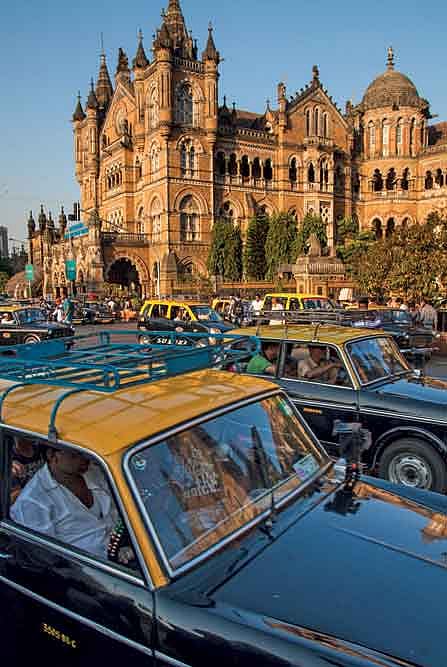Kaali Peeli: The Wheels of Mumbai

IN THE 1954 BOLLYWOOD film Taxi Driver, which came out 22 years before the celebrated Martin Scorsese classic by the same name, the character played by the actress Kalpana Kartik asks the film's hero, Dev Anand, who is playing a taxi driver, if he is wealthy. She is under the impression everyone who owns a car, even a taxi, would be rich. "Dekho, motor amiro ki naukar hoti hai, taxi garibo ki annadata (Look here, motorcars are the servants of the wealthy, taxis are the providers of the poor)," he reprimands her.
The taxi shown in the movie isn't a Premier Padmini. The cab that became an iconic presence in its black-and-yellow avatar was still some years away from being rolled out into the streets. But it set the scene for one of the city's great romances about to unfold.
In the years since, once the first Premier Padmini rolled out into the streets as a taxi, it became an indelible feature of the city. Its top was painted a bright yellow, it was said, so it could be easily visible to anyone in need of a cab, and the rest, black, so it could hide the blemishes a city like Mumbai would no doubt bestow. It was both equally loathed and romanticised. The graffiti that adorned its rear windscreen began to be pushed by some as an art, especially as the numbers of Premier Padminis began to dwindle. It was also celebrated in countless films, sometimes just as a shot establishing the film's location, and oftentimes, playing a more vital part, the role of a raffish and honest taxi driver bestowing the film's lead with the image of a working-class hero. These roles have been performed by several actors, from Dev Anand (who had Taxi Driver remade in 1976 as Jaaneman, where he drives a Premier Padmini this time), Amitabh Bachchan, Sanjay Dutt, Rajinikanth, Anil Kapoor, and many more, including Ishaan Khatter just a few years back (the film's title Khaali Peeli, being a play on the words kaali peeli or black-and-yellow).
Openomics 2026: Continuity and Conviction
06 Feb 2026 - Vol 04 | Issue 57
The performance state at its peak
The Premier Padmini had been rapidly dwindling over the years. And as October drew to a close, so too did the last of its cabs. Maharashtra has a 20-year age limit for cabs, and the last Premier Padmini taxi (which was traced to a resident of Prabhadevi in central Mumbai, Abdul Kareem Karsekar) had got his cab registered on October 29 in 2003.
The earliest versions of the Premier Padminis were not known by that name. They were called Fiat 1100, the result of a joint venture between Premier Automobiles of India and the Italian company, Fiat. The first vehicles that came out in the early 1960s were essentially the same vehicle Fiat had launched in Italy in 1962. By the early 1970s, however, with the Indian government insisting that the car be produced indigenously, the joint venture had come to an end. The vehicle produced in 1973 then was briefly named Premier President. But, according to one unconfirmed story, a bureaucrat objected to the new name. So, from 1974 onwards, it got its new name, Premier Padmini.
In a tightly-controlled automotive industry, it became the vehicle of choice for upper middle-class Indians. Its only real competition was the Hindustan Motors' Ambassador, which became favoured by government officials. When the market opened up in the 1990s, and many more types of vehicles became available, its days were numbered, and all production ceased in 2000. The classic model, however, remained popular as a taxi in Mumbai. It was cheap and easy to drive, had a large trunk, and provided ample legroom for passengers and drivers. Even when it got discontinued, its parts were easily available in various garages across the city. At one point in 1997, there were 62,300 Padminis operating as taxis in Mumbai.
The taxi union wants the government to preserve one such taxi and showcase it as a tribute. That seems unlikely. We will just have to switch on an old film or revisit our own memories to remember that once ubiquitous image of Mumbai.
